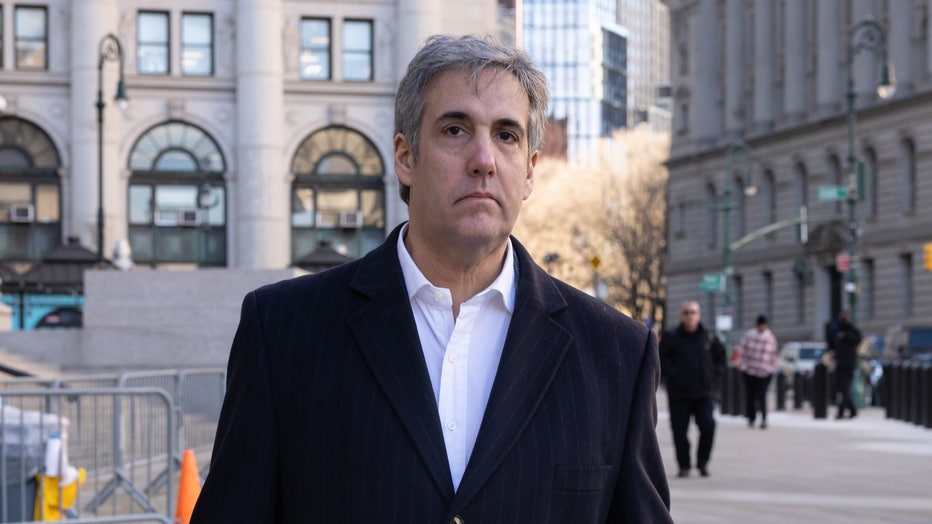Prosecutors consider postponing Donald Trump's hush money trial set for March 25
Prosecutors may postpone Trump hush-money trial
New York prosecutors said Thursday they are open to delaying the start of Donald Trump's hush-money criminal trial by a month "in an abundance of caution" to give the former president's lawyers time to review evidence they received only recently from a previous federal investigation into the matter.
NEW YORK - New York prosecutors said Thursday they are open to delaying the start of Donald Trump's hush-money criminal trial by a month "in an abundance of caution" to give the former president's lawyers time to review evidence they received only recently from a previous federal investigation into the matter.
The Manhattan district attorney's office said in a court filing that it's not opposed to adjourning the start of the trial for up to 30 days, but said it would fight the defense's demand for a longer delay. The evidence Trump's lawyers received from the U.S. attorney’s office in Manhattan is "largely irrelevant to the subject matter of this case," the district attorney's office said.
Jury selection in the hush-money trial is scheduled for March 25. It is one of four criminal cases against Trump, the presumptive Republican presidential nominee.
Trump posts $91.6M bond in E. Jean Carroll case
Donald Trump has secured a bond sufficient to support the jury award granted to writer E. Jean Carroll during the defamation trial, FOX 5 NY's Robert Moses reports.
Trump's lawyers are seeking a 90-day postponement and have also asked Judge Juan Manuel Merchan to dismiss the case, alleging that the last-minute disclosures violated rules governing the sharing of evidence. That process, called discovery, is routine in criminal cases and is intended to help ensure a fair trial.
Short trial delays because of evidence issues aren't unusual.
Since March 4, Trump’s lawyers have received at least 84,000 pages of records from the U.S. attorney's office, including a batch of 31,000 pages on Wednesday, according to a court filing.
The defense has also sought to delay the trial until after the Supreme Court rules on Trump's presidential immunity claims, which his lawyers say could apply to some of the allegations and evidence in the hush-money case. The Supreme Court is scheduled to hear oral arguments April 25.
Merchan has yet to rule on either request.

Michael Cohen, former personal lawyer to US President Donald Trump, arrives at federal court in New York, US, on Thursday, Dec. 14, 2023. Photographer: Yuki Iwamura/Bloomberg via Getty Images
The New York case centers on allegations that Trump falsified his company’s internal records to hide the true nature of payments to his former lawyer and fixer Michael Cohen, who helped Trump bury negative stories during his 2016 presidential campaign. Among other things, Cohen paid porn actor Stormy Daniels $130,000 to suppress her claims of an extramarital sexual encounter with Trump years earlier.
Trump pleaded not guilty last year to 34 felony counts of falsifying business records. He has denied having a sexual encounter with Daniels, and his lawyers argue the payments to Cohen were legitimate legal expenses and not part of any cover-up.
Trump has repeatedly sought to delay the start of his criminal trials.
"We want delays," Trump said to reporters at a pretrial hearing in the New York case on Feb. 15. "Obviously I’m running for election. How can you run for election if you’re sitting in a courthouse in Manhattan all day long?"
The deluge of evidence that spurred Trump's lawyers to request a delay pertains to a federal investigation into the hush-money matter that sent Cohen to prison.
After a decade of working for Trump, Cohen broke with his boss in 2018 and soon pleaded guilty campaign finance violations related to the hush-money payments, making false statements on a bank loan application, evading taxes related to his investments in the taxi industry and lying to Congress. The contributions were in the form of payouts to women who said they had extramarital sexual encounters with Trump, who denied them.
Cohen served about a year in prison before being released to home confinement because of the COVID-19 pandemic. He became an outspoken Trump foe and is poised to be a key prosecution witness in the hush-money trial. Trump and his lawyers, meanwhile, have portrayed Cohen as completely untrustworthy.
While federal prosecutors said in their case against Cohen that the hush-money payments were done to benefit Trump, and occurred with his knowledge, they stopped short at the time of accusing Trump of directly committing a crime.
The Justice Department’s Office of Legal Counsel, which provides legal advice and guidance to executive branch agencies, has maintained that a sitting president cannot be indicted. The U.S. attorney in Manhattan didn’t revive the investigation once Trump left the White House.

